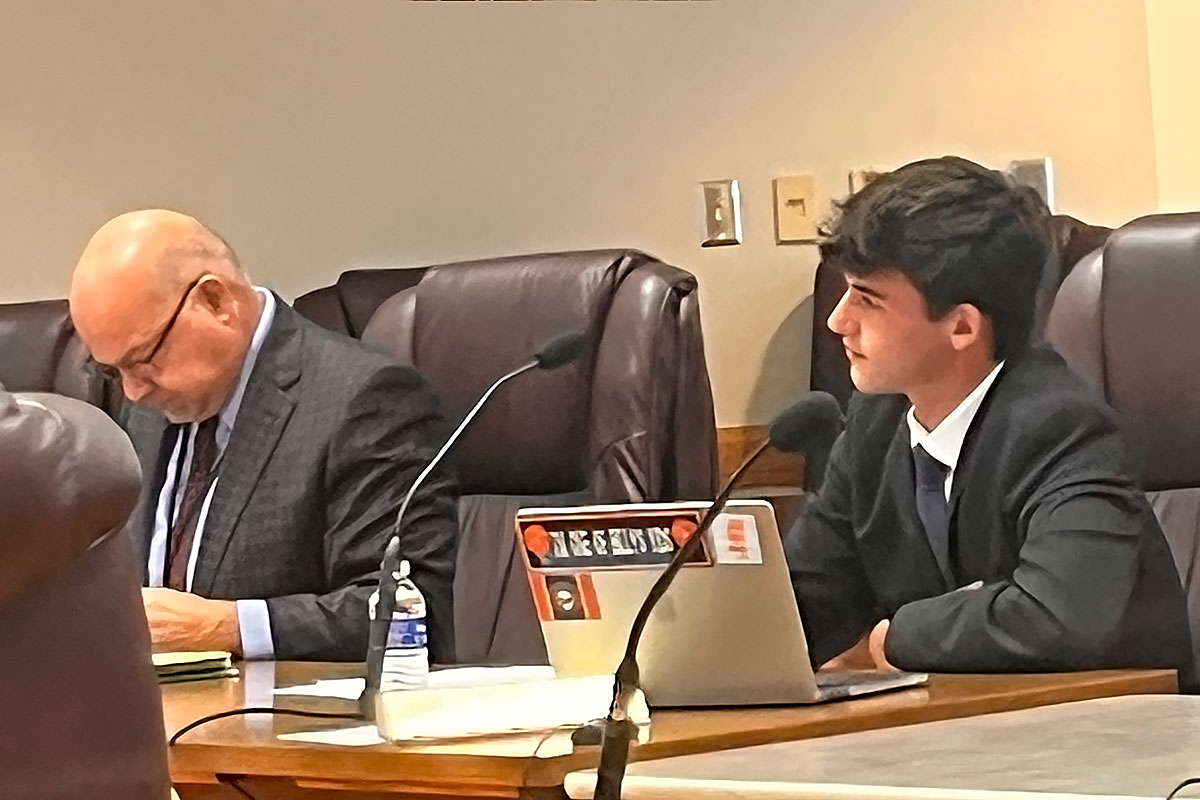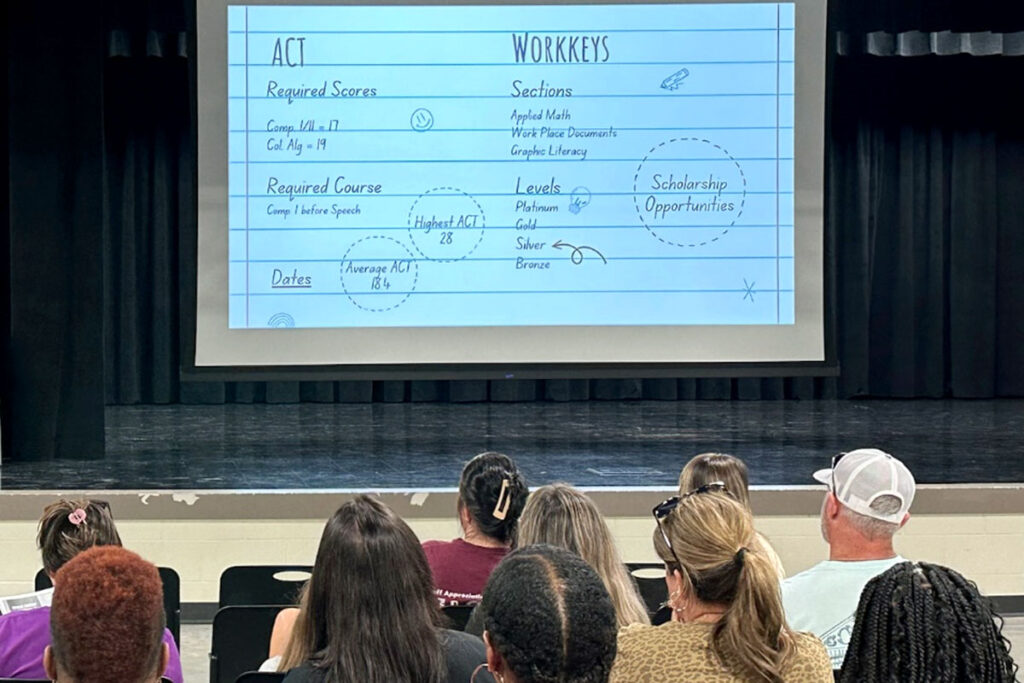Mississippi Department of Education Senior Student Representative Charlie Frugé leaned forward and comfortably began his presentation during the Oct. 19, 2023, MDE board meeting.
Board members perused the ACT-prep questions that Frugé had given them before the meeting while he directed their attention toward the practice test that reflected on the projection screen. He explained how he used the document in his free ACT Club and how students struggled with the content on the test. He told board members that he has noticed three groups of test-takers.
“The kids in group one … they are paying for the hitting coaches,” the Oxford High School student told the board. “They are sent out there with the big bats and big barrels, and that ACT is the same fastball down the middle every time. They know it’s coming, (and) they will hit a home run every time.”
“The kids in group two might have paid for a hitting coach with their parent’s money, or their school may have a hitting coach on staff. They are going to have a normal baseball bat, and they might hit a double,” Frugé continued. “But the kids in group three don’t have any help. They’re going to march out to home plate with their state-issued toothpick and try to get on base. They might get hit by a pitch, and they might get to second.”
Frugé posed the question to the board: How could the state upgrade its ACT-preparation practices from the state-issued toothpick to the big-barrel bat?
The ACT is a timed aptitude test that colleges and universities use to make entrance and placement decisions. The nonprofit organization, ACT, Inc., administers the multiple-choice assessment, and scores are also often used as a determinant of eligibility for numerous merit-based scholarships. The test is composed of four sections evaluating proficiency in English, mathematics, reading and scientific reasoning. Each section is scored individually, on a scale of 1 to 36, with the average of the sections constituting the overall composite score.
Nearly 1.4 million American students from the graduating class of 2023 took the test including 35,510 from Mississippi.
Six Consecutive Years of Decline
Mississippi’s ACT composite average for the graduating class of 2023 is 17.6 of 36 compared to the national ACT average of 19.5. The average score for last spring’s junior class statewide administration is 17.5, up from 17.4 in 2022 and 17.3 in 2021. Mississippi’s composite-score average is one of the lowest in the country.
However, state education officials say comparing this state to most of the others is not fair.
“The best thing to compare us to are other neighboring states that also give the ACT to all of their students,” MDE Executive Director of District and School Performance Alan Burrow told the Mississippi Free Press on Oct 23. “You know, requiring that all students in the state take the ACT makes a big difference in the average.”
Mississippi is one of 13 states that mandate the ACT. Each spring, schools across the state administer the test to all juniors during their regular school day. ACT reports eight as having tested 100% of its graduates and five others testing between 95-98%. Alabama, Arkansas, Louisiana and Tennessee are all among that number. Each has between a 0.4 to 1 point higher average composite score than Mississippi.

These figures present an issue for a state boasting a struggling economy and a population where fewer than 25% of residents over the age of 25 hold a bachelor’s degree. ACT research shows that students meeting test benchmarks have approximately a 50% chance of earning a B or better and approximately a 75% chance of earning a C or better in the corresponding college courses.
Scores are declining nationally.
“This is the sixth consecutive year of declines in average scores, with average scores declining in every academic subject,” ACT CEO Janet Godwin said in the press release. “We are also continuing to see a rise in the number of seniors leaving high school without meeting any of the college-readiness benchmarks, even as student GPAs continue to rise and students report that they feel prepared to be successful in college.”
“The hard truth is that we are not doing enough to ensure that graduates are truly ready for postsecondary success in college and career,” she continued in the release. “These systemic problems require sustained action and support at the policy level. This is not up to teachers and principals alone—it is a shared national priority and imperative.”
Burrow believes that COVID-related education loss is also at play. The graduating class of 2023 were high-school freshmen when the COVID-19 pandemic closed schools. Nationally, 43% of students met none of the test benchmarks, an increase of 1.7% from 2022; 21% of students met all four benchmarks, a decrease of 1.3% over the previous year. Mississippi’s numbers are even more alarming. Only 9% of the state’s public-school students met all four benchmarks, and 57% met none of them.
“We feel like we’re still seeing the impact from the pandemic with this class,” Burrow said.
No Mandated ACT Curriculum
Associate State Superintendent Wendy Clemons said that although every public-school student in the state is required to take the test, the state has no mandate on curriculum for ACT prep, nor are students in the state required to take a preparatory course.
“We do have a college and career-readiness class,” Clemons told the Mississippi Free Press on Oct. 26. “That is a one-credit course that can be offered throughout the 9th through 12th grade span of a child’s high-school years. (A school) can incorporate a course ACT prep into that, but we don’t require a separate course.”
Schools that offer the ACT Prep courses are required by MDE to have an endorsed teacher and performance does count toward a school’s achievement rating. High schools can earn up to 1,000 points on the rating scale. ACT performance counts for 47.5 points on the scale. A school earns points for student’s meeting the benchmarks established by ACT.
“That component reports whether or not students meet benchmark benchmarks on the ACT in English or reading and math,” Burrow said. “The benchmark for English is 18 and for reading and math the benchmarks are 22.”
Students can also meet the requirements for graduation by meeting ACT benchmark scores.
“So in lieu of passing the end-of-course assessment, the student can earn a 17 on the ACT in math, science, (and) English,” Burrow said.
Most students will take the test more than the one mandated ACT exam presented to Mississippi students during their junior years. Socioeconomically disadvantaged students may take the test at no cost up to four times via the ACT fee waiver program.
Students who register for the ACT with fee waiver receive free access to ACT Kaplan Online Prep Live test-preparation program. An ACT study found that students from low-income families who used the resource increased their score by almost one point more than low-income non-participants.
The importance of the ACT exam has made test preparation a lucrative industry. There are numerous types and methods used for test prep. One study found that students who participated in ACT test preparation before taking the test a second time increased their ACT composite score by 0.71 scale points over those who did not. That same study also shows that the effects of test preparation did not differ by race, ethnicity, gender or family income and that working with a private tutor had a significant effect on retest scores.
“We know through the data that ACT prep does make a difference in testing outcomes on the ACT,” Burrow said. “That and taking the ACT more than once; both have a significant impact.”
However, like Frugé indicated ACT prep looks very different in schools across the state.
Radical Differences
Tamara Taylor straightens the pictures on the ACT wall at Richland High School. She takes great care in ensuring that the walls, one blue and one red, featuring students who have scored within certain ranges are prepared for photos.
“It wasn’t my idea,” she said. “I like it though.”
Rankin County has one of the state’s most robust ACT-preparation programs. Taylor is one of four teachers at Richland High School who teach the school’s year-long ACT-prep course. Juniors rotate between teachers specializing in each section before they take the exam in the spring. Each student has a Mastery Prep workbook for each section and access to other preparation resources.

College and Career Ready Prep Specialist Montgomery Hinton built the county’s program nearly from its beginning. MDE allows each district to offer either a whole-credit or half-credit test preparation course. RCSD trains teachers on the ACT preparation program that the district has adopted and provides instruction on strategies that test-takers can use on the exam. The district also hosts ACT workshops and tutoring sessions.
“Each one of those schools has an ACT prep program,” he said. “Some of them are optional; some of them the principal makes each student go through. (It) looks a little different at each place. They also get a boot camp and then we provide remediation and online programs. We have all kinds of resources that are built to help prepare our students.”
Hinton, who had more than 23 years of classroom experience when he stepped into his current role, is ACT-certified in English, math, reading and science. He also has platinum ACT WorkKeys certification and takes the released tests himself to keep abreast of what students are required to know.
Teachers at each school track student’s ACT scores and help set goals for growth. Schools recognize growth and high scores, and the district provides a cash award to the student who has shown the most growth in their ACT score. Hinton tracks each school’s progress and provides reports every six weeks. He produces a chart showing how the district, each school zone and each grade in the zone compares to the national, state and district averages. The efforts are seeing success as Hinton said that in the last three years several schools have seen two-plus points in their composite-score growth.
“The national average has gone down and Mississippi has gone down. Fortunately, Rankin County is trending the other direction,” Hinton told the Mississippi Free Press on Nov. 17. “Our average is 18.3; the state average right now is 17.6. So already across every grade band, we’re ahead of the state average. … Our goal is to get every student above the national average.”
Rankin County is also one of a handful of districts in the state that also gives the test to each of its sophomores. Hinton said that Rankin County was also the first district to test each of its juniors on the ACT Work Keys exam. That exam measures foundational and workplace skills that can affect job performance.
“We want to give every student an opportunity to enroll in dual-credit classes their junior year, and that can be CTE dual credit classes,” Hinton said. “We’re really big on Career Technical classes because that’s a great field where (students) can quickly find themselves.”
‘Their Problems Are Multifold’
Clemons could not say whether all 142 school districts and their high schools are presenting students with opportunities to prep. Not all schools offer the classes, and some schools may offer the course but not to all students. She said that this variance is why MDE focuses more on rigorous class instruction.
“We need to focus on rigor in the classroom, rigor in the English class, and then the math class and science, etc,” Clemons said. “You can offer a separate prep class, and you can teach the students how to take the test, but ultimately the content is taught in the courses.
Clemons said that when she was a principal, she used these courses to allow students to learn test strategies and gain practice.
“I would offer ACT Prep I to students who were in a certain score range,” Clemons said. “And then I’d offer ACT prep II to students who were in a different score range and maybe had different goals for where they wanted to go.”
Hinton agrees with Clemon’s belief that rigorous classroom instruction plays the most vital role in how well students perform. However, he notes that part of scoring well includes knowing how to take the test.
“If you ask most children what their problems are, their problems are multifold,” Hinton said. “But one of their issues is time management. They’ve never had to sit down and take a test for that period of time. I believe that the practice is very, very important, and what’s really also very important is that the practice be authentic.”
Those problems are a large part of what RCSD addresses in its school-based test preparation.
“My strategy for my class is testing,” Taylor told the Mississippi Free Press on Oct 23. “Strategies are like following the road signs and looking at the questions ahead.”
Clemons said that many schools require ACT bellringers, a short assessment, activity or assignment that students complete as soon as they enter a classroom. The idea is to allow students to practice with a question related to the skill students are studying.
“(Teachers) will put up an ACT question from one of the practice tests,” Clemons said. “The students will have to annotate the question or kind of break it down. Then they will go over it and talk about not only the concept of what is the answer but also how you get to that answer—how you navigate that test question.”
| https://youtu.be/CLehNoWCqv4?si=xiyaFZ7xJ28qMRiu> |
| West Bolivar High School recognizes students who earned 20 points or higher on their ACT exams. Video courtesy Christopher Turner |
First-year principal Christopher Turner understands the test-performance challenges his students face. The school’s average for the 2023 state administration is 13.7, one of the lowest in the state.
“I went back and grabbed some data from previous times,” Turner told the Mississippi Free Press on Nov. 24. “You know where our school is. Our goal was to then begin to impact that. We want to start that by having the right programs that put the right people in place to support student learning. We understand that a low score on the ACT will ultimately work against our students entering college and even the finances for college.”
West Bolivar also offers test preparation as a course for its students. One certified instructor teaches the course and covers all subjects using the Jumpstart test-prep curriculum. Turner said that the school’s size and financial position doesn’t allow for a specialized teacher for each section of the test.
“(We) don’t have as many human resources due to the size of the school,” Turner said. “It would be great to have those multiple staff members, and then they can specialize in those areas. That’s super, super awesome but we don’t have that luxury right now.”
Turner said that the school is already seeing improvements in scores. He has instituted a recognition program for students who score above a composite score of 20. The school provides each student with a yard sign designating them as part of the 20-point club. Seven students have already been inducted.
“Seven is a decent-sized number for us. Our total number of students is 241,” Turner said.
‘What Happens Next?’
Fruge’s presentation gave board members something to consider.
“I think that this board and the education professionals in the room may have just heard a challenge,” board member Mike Pruitt said during the discussion. “I’d hate for Charlie to put the effort he put into a very well-delivered baseball analogy and us go ‘Wow, that was great. See you next month.’ What happens now? What happens next?”
Interim Superintendent Raymond Morgigno told the board that the state should remind districts that the ACT website has free tutoring resources. Resources are also available on the MDE website. Even still, he admitted the potential power of preparation classes in local schools.
“Sometimes though that’s not as effective as that person-to-person type, so it is really effective when you can have those ACT-prep courses,” Morgigno said.
The next ACT test will take place on Feb. 10, 2024. The deadline for students to register is Jan. 5, 2024. For more information or to access ACT Inc.’s test-prep resources, visit act.org.










